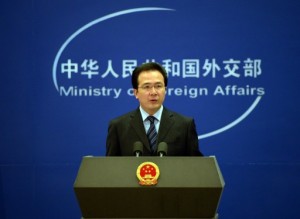BEIJING — China criticized Japan on Monday for its plans to install a cutting-edge U.S. military radar system to monitor North Korean missile launches, saying that could impact regional stability and upset the strategic balance.
The X-band radar system would boost Japan’s ability to track and intercept missiles from across the Sea of Japan. That was “not conducive to regional nuclear non-proliferation and stability, and will cause an extremely negative impact on the global strategic balance,” Chinese Foreign Ministry spokesman Hong Lei said.
“Some countries or blocs in the region, on the pretext of the North Korea nuclear threat, have unilaterally set up anti-missile systems or conduct bloc cooperation (with the United States),” Hong said.
The comments came after the governor of Japan’s Kyoto region, where the radar will be based, endorsed it last week. The facility will be staffed by as many as 160 U.S. service members and civilian contractors.
Hong’s statement implied the radar was being installed for purposes other than to keep tabs on North Korea, although he gave no details. China tends to see virtually all U.S. military activity in Asia as part of a plot to curb its growing military, diplomatic and economic power.
The issue also comes amid ongoing tensions between Tokyo and Beijing over an East China Sea territorial dispute. Beijing has issued months of angry rhetoric and frozen high-level contacts with Japan following Tokyo’s nationalization last year of tiny islands claimed by China. Patrol boats from both sides regularly confront each other in the waters surrounding the uninhabited archipelago.
China also is highly critical of the U.S.-Japan military alliance along with Tokyo’s moves to upgrade its armed forces, saying they are steps toward a revival of the strain of militarism that led to Japan’s brutal invasion and occupation of China in the 1930s and 1940s.
